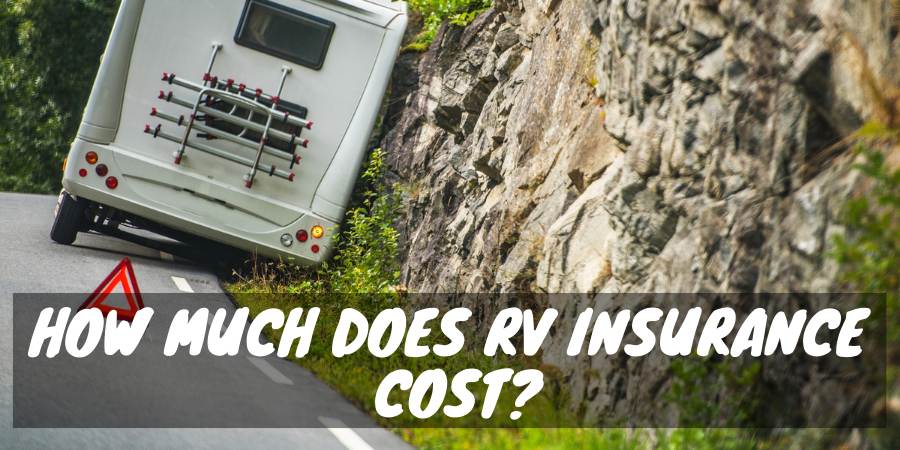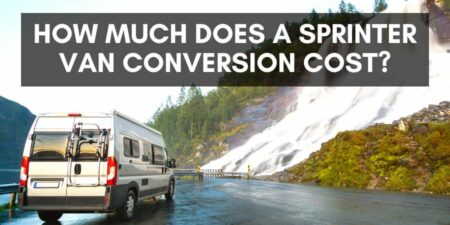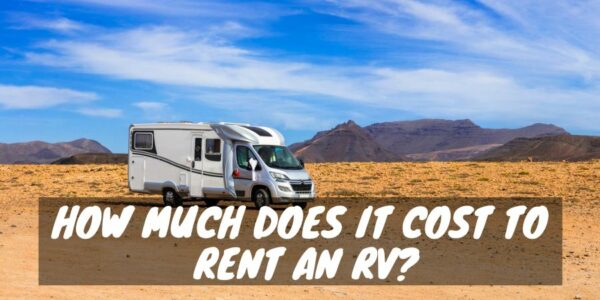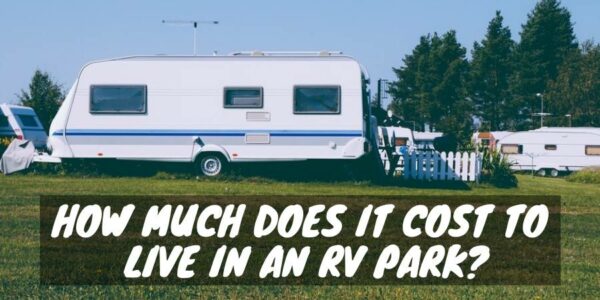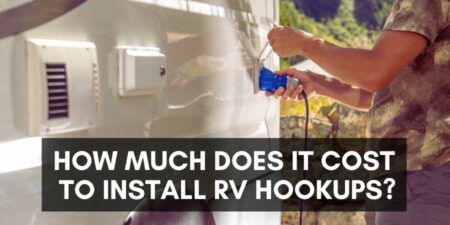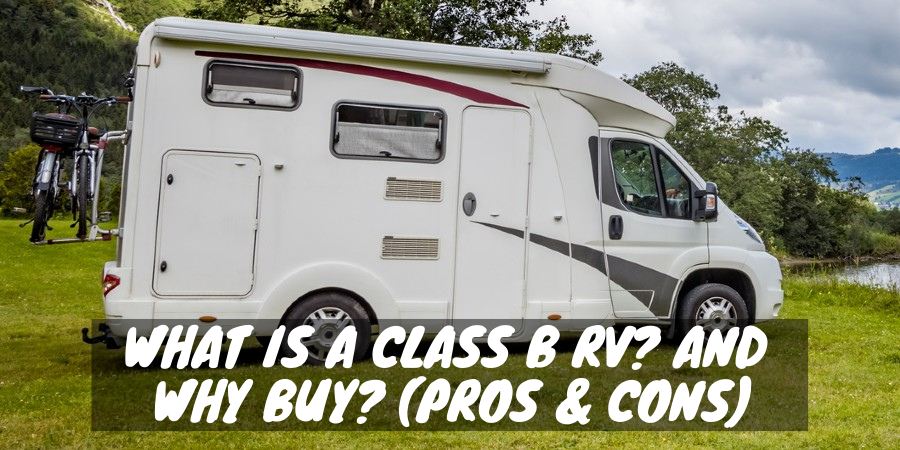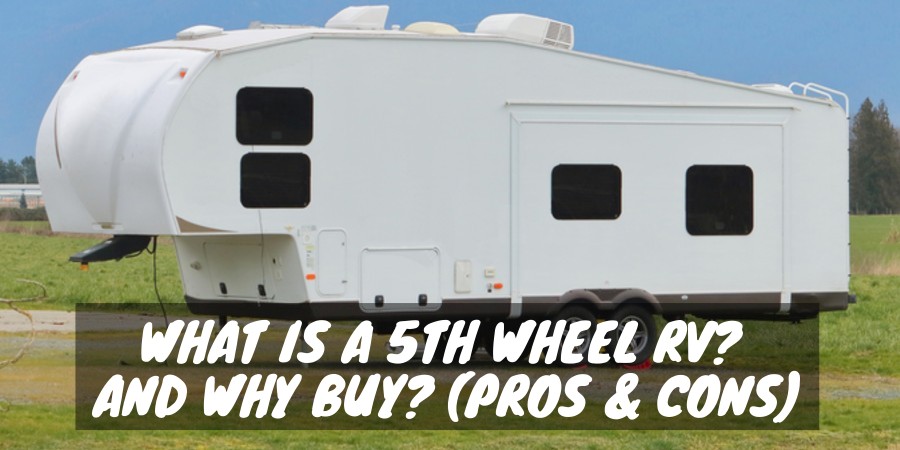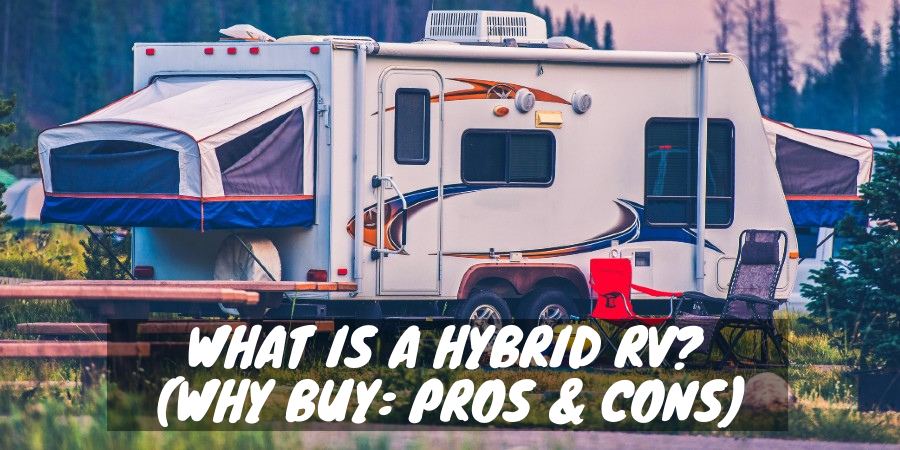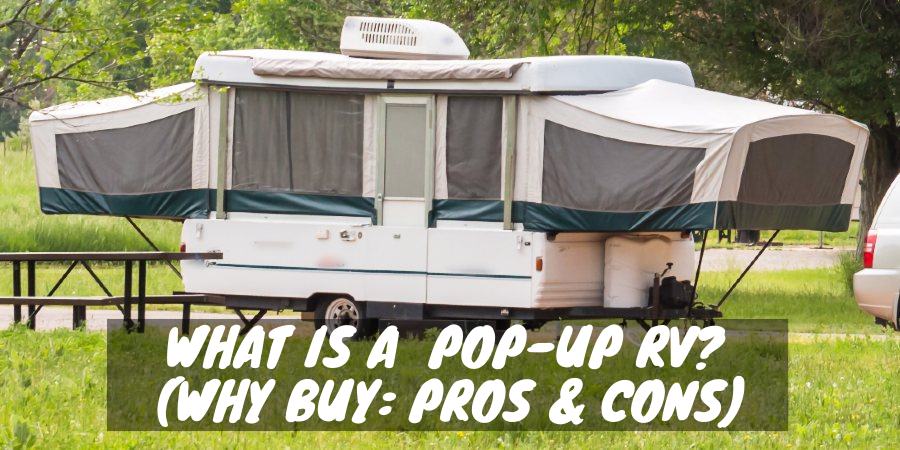Owning a recreational vehicle means knowing what to expect when it comes to insuring it properly.
While not every type of camper requires insurance, going without to save on premiums can be a foolish move that may cost you much more in the event of an accident.
To help you sift through all the information regarding RV insurance, I put together this camper insurance cost guide. Inside, I discuss:
- The average cost of travel trailer and motorhome insurance
- Factors that affect policy price
- Reasons you need camper insurance
- Coverage options
- Best companies for RV insurance
Along the way, I also answer some frequently asked questions about insuring campers and point out where to look for the cheapest RV insurance rates.
Knowing what camper insurance will cost and what type of coverage you need will make securing the right policy much more straightforward so that you can hit the road with confidence!
How Much Is Insurance on an RV Trailer?
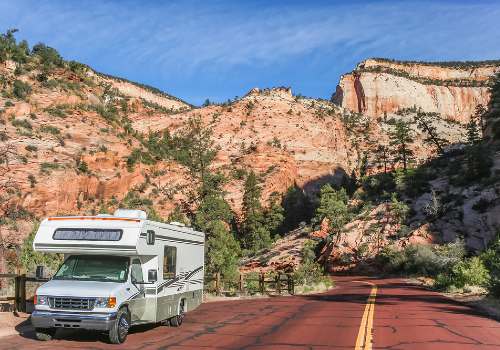
Purchasing a separate policy for a travel trailer is not required but will cost, on average, from $350 to $750 per year.
Towable vehicles, such as campers, gain some insurance protection through a person’s automobile policy.
That person’s auto insurance policy should be enough to cover damage to other people’s property or for bodily injury but will not cover any damage to the travel trailer.
According to autoinsurance.org, to qualify for liability coverage in an accident, the person driving must be the registered owner of the trailer.
Liability coverage on the trailer also won’t pay for damage from weather events, theft, or the kid on the next campsite throwing a baseball through the camper window.
So, if you are renting or borrowing a towable camper, you need to ensure you have coverage to offset any insurance gaps. Adding comprehensive and collision to all travel trailer policies is smart.
Most states consider a trailer to be any of the following:
- Toy Hauler
- Travel Trailer
- Mounted Truck Camper
- Fifth Wheels
- Pop-up Tent Trailer
- Horse Trailer
- Cargo or Utility Trailer
The final cost of a comprehensive, full-coverage camper insurance policy may reach $60-$100 a month for a travel trailer, especially a high-end model, so take this cost of protection into consideration when budgeting for a camper.
How Much Does It Cost to Insure a Motorhome?
The average cost to insure a motorhome breaks down like this:
Class A – $1,000 to $4,000+ yearly
Class B – $750 to $1,500 yearly (Most campers of this size can classify for an automobile/van policy)
Class C – $1,000 to $3,000 yearly
Attaining adequate motorhome insurance is more expensive since it’s more like an automobile policy stuck to a homeowner’s policy.
The cost to replace a motorhome is also generally higher than a travel trailer, which drives up the insurance price.
The range in size, amenities, and type of motorcoach also determines the final cost. Insurance on a luxury Newmar Class A may run $800 or more a month!
You’ll need to maintain more expensive full-coverage insurance if you finance your RV and will also need excellent insurance if you rent a motorhome.
What Factors Affect RV Insurance Cost?
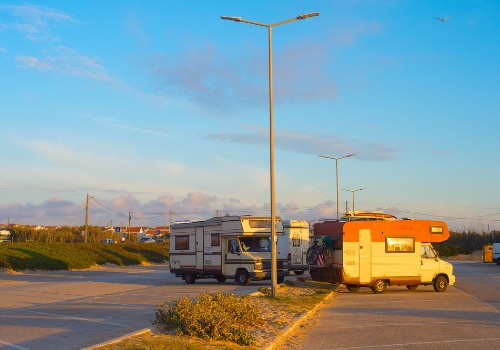
RV insurance rates differ according to many factors. Read through the list below and make notes of your specific information before calling for quotes.
RV TYPE
Is your RV a motorhome, a travel trailer, or a pop-up? The value of your camper and whether you drive it or tow it affects the final cost.
RV AGE
Most insurance agents will ask how old your camper is and base “condition” or value of it for replacement purposes on that number.
The issue is that many vintage campers are valuable, and you may want better replacement coverage than they’re willing to offer.
I had this happen to me, and here’s a tip to help you out.
My motorhome was 29 years old when I began shopping for insurance. The agent said I could get $5,000 in replacement value, which was a scary number for someone going full-time and who had put money into a full refurbishment.
On his suggestion, I paid for an independent RV appraisal, which cost me $200, but the final value came in at $15,500.
With the appraisal in hand, my agent could provide me with a policy more realistic in terms of making me whole in the case of a total loss.
HOW MUCH YOU TRAVEL IN YOUR CAMPER
Many recreational vehicle insurance companies base rates on 140 days or less of travel per year.
If you plan to go full-time, you’ll exceed this number. (Although it may be hard for the insurance company to prove how many days that year you had the camper on the road.)
The likelihood of an accident or filing a claim is higher the more miles you travel, so your rates will rise.
YOUR STATE AND ZIP CODE
Some states and even zip codes within a state have a higher cost of insurance than others. For example, coverage in Florida is about twice what it is in neighboring Alabama.
Other factors, such as high-traffic-density urban areas, burglaries, and vandalism, also play a part in the rates you pay.
DRIVING RECORD AND CLAIMS
Like a car, the longer you drive your camper without an accident, ticket, or claim, the lower your rates will be.
Expect the agent to ask you how much experience you have driving your camper.
If you’re a newbie, consider taking an RV driving safety course (many dealerships offer them) and share that with your agent to fight for a lower rate.
WHERE YOU PLAN TO TRAVEL
RVers often travel outside our borders to explore Mexico and Canada (or even ship it overseas!), so if this sounds like something you plan to do, inquire about coverage extension.
Most insurance companies will cover your camper if you get into an accident in Canada, but Mexico is probably not covered. Europe, Africa, or Asia are also places where you’ll need to purchase a separate policy.
Does Insurance Cost More if You RV Full Time?
Yes, you’ll pay more for camper insurance if you full time, but this is merely a reflection of having more extensive coverage.
If something happens to your RV as a full-timer, you may need a car rental, temporary housing, or quick repairs. Having excellent insurance coverage is the only way to offset the cost of these scenarios.
After a quick polling of my full-time camping friends, it appears the average cost we pay for camper insurance is between $60-$160 a month for motorhomes and $30-$80 a month for travel trailer owners.
Why You Need Camper Insurance
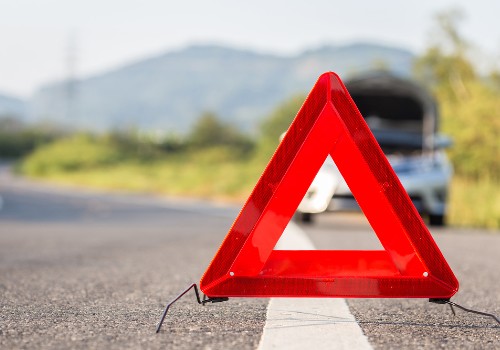
Why buy RV insurance? Because recreational vehicles are expensive to purchase and repair.
Motorhome owners will need insurance to drive legally in all states, but even those with travel trailers that don’t technically need insurance coverage should consider having it.
I have personally been witness over the years to all these common RV campground accidents:
- Clipping other campground guest cars during arrival or departure
- Smashing power pedestals
- Hitting trees or low-hanging branches
- Running into buildings with back-end swing-out
- Running over sewer and water connections
- Turning too tightly with a fifth wheel and busting out the back truck window
- Bad hitch hookup causing camper to drop, smashing tailgate or truck bed
- Frying RV appliances by hooking up to power incorrectly
- Camper fire from faulty heater, wiring, or oven
- Awnings torn from the camper during storms/high winds
If you think the campground will cover the cost of you tearing out their power pole or crushing their sewer connection under their property insurance coverage, think again.
Aside from campground accidents, there are still the normal road travel accidents that include:
- Hitting other cars or equipment at gas stations
- High winds causing the camper to overturn
- Hitting other vehicles due to poor visibility when changing lanes
- Losing control of a travel trailer from overload or inferior hitch rating
Insuring your pull-behind camper is critical if it is expensive or it’s full of pricey personal belongings. I have seen many motorhomes on the side of the highway with a tire blowout, but never seen one in a typical accident.
I have seen more travel trailers than I can count tipped over on the side of the highway or smashed to bits from a complete rollover. I have also seen countless trailers going 70 MPH with so much sway and vibration it’s frightening!
If you don’t plan to insure your trailer in states where it isn’t a requirement, please spend money on proper hitches, sway bars, and a tow vehicle with the capacity to pull it safely.
What Kind of Insurance Do I Need for an RV? Critical Coverage Facts
There are many extra coverage options you should consider when selecting camper insurance, such as:
- Transportation/car rental expenses/roadside assistance
- Total loss replacement value
- Food and lodging expenses during emergencies
- Personal property replacement for accidents or theft
- Liability protection against persons or property
- Fire or water damage
- Protection of RV during storage
Want to Connect With a Community of Over 1,078 RV Enthusiasts?
Most states will require minimum liability insurance for your motorhome or travel trailer in case of damage or injury to other parties.
Collision coverage is always a good idea, as this covers you when you are at fault in an accident.
Comprehensive coverage is a must. This policy will cover all those odd, non-driving damages, such as those from theft, fires, acts of nature (such as a tree falling), animal or pet incidents, and other random things.
Add-on riders for valuables is another potential policy coverage you need to explore. Many RVers bring along expensive computers, guns, jewelry, coin collections, etc., that won’t necessarily get reimbursement under standard RV insurance coverage.
You should also ensure you have protection against uninsured or underinsured motorists since you can’t trust every driver on the road to have ample coverage.
Will RV Insurance Cover Water Damage?
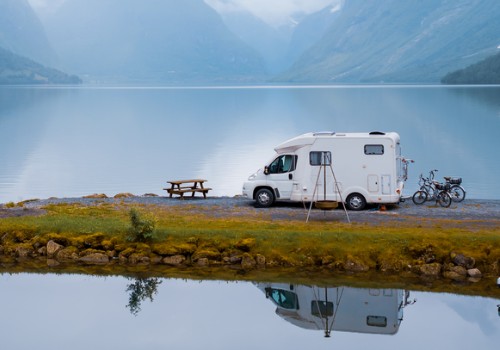
Many policies may state they cover water damage, but it gets a bit confusing when you read the fine print.
Always get clarification, as many policies state they won’t cover water damage caused by weather events, corrosion, defects in manufacture, everyday wear, or other general reasons.
So if your plumbing fitting breaks loose and floods the camper, you may have to pay out of pocket for new flooring because it broke from “normal wear or a defect.”
What Company Provides the Best RV Insurance?
The top companies for reliable recreational vehicle insurance are:
- National General
- Good Sam
- Progressive
- Nationwide
- Safeco
Shopping for the best RV insurance can be tedious, but you need to set aside time to compare your options.
You’ll want to ask questions about your specific coverage needs, so having an agent on the phone is much faster to get the answers you need.
Here’s what makes these insurance companies stand out in the RVing world:
National General: Offers affordable coverage on all types of RVs, including unique add-ons for a wide range of needs like costly equipment, personal items, lodging and food, rental cars, and roadside assistance.
The company covers both full and part-time RVers and offers discounts for safety courses, low mileage, and more. You can also move your camper over to “storage” rates when not in use to lower premiums further.
Good Sam: Full-time RVers often choose this company for their excellent understanding of customer needs by offering such policy coverage as personal and vacation liability, medical payments for non-policy members, allowances for emergency expenses, and more.
The company is an umbrella for four separate insurance agencies but delivers high customer satisfaction ratings and gives clients perks such as fuel and campground discounts.
Progressive: RVers find using this company quick and simple. Starting rates for liability are very reasonable, but do expect things to increase as you customize and expand your policy.
With super-quick customer service when handling claims, you can rely on this company to be there when you need them.
Nationwide: All RVers will find this company delivers excellent collision and comprehensive coverage rates, as well as discounts, vacation liability, roadside assistance, and many more options to create the best policy for your needs.
Total loss replacement, vanishing deductibles, and other add-ons are easy and affordable to beef up your coverage.
Safeco: If you are a part-time camper, Safeco (a Liberty Mutual company) offers excellent RV coverage for those who travel under 250 days a year.
What sets this company apart is its pet coverage option, replacement service for electronic lock and key, protections for custom RV equipment, vacation interruption, rental vehicle, claim-free discounts, accident forgiveness, and more.
Final Thoughts
Even a small accident in an RV can cause extensive damage to your camper and other property.
Having the right insurance coverage gives you peace of mind that you aren’t stuck with huge repair bills when things go wrong.
Set aside money in your budget for the best coverage from the best company, and tailor it to fit your needs. Trust me when I say camper insurance is worth every penny!
How Much Is RV Insurance (Video)
"Man cannot discover new oceans unless he has the courage to lose sight of the shore."
-- Andre Gide

